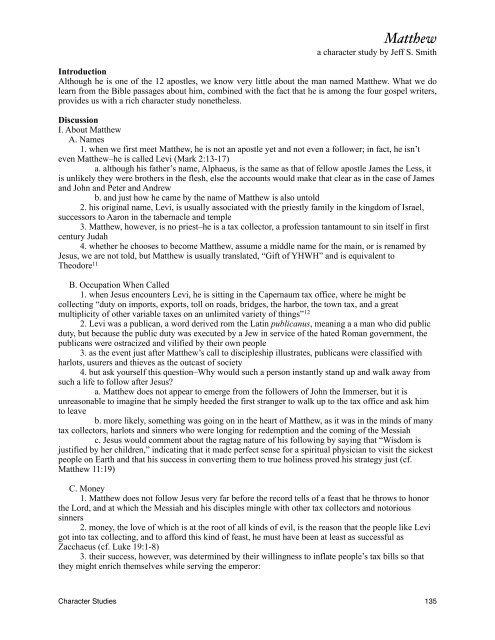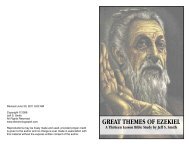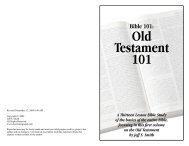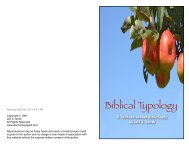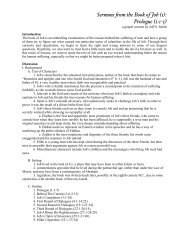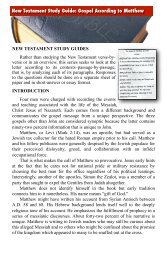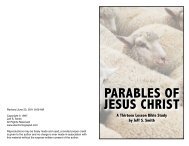Character Studies - ElectronicGospel
Character Studies - ElectronicGospel
Character Studies - ElectronicGospel
- No tags were found...
Create successful ePaper yourself
Turn your PDF publications into a flip-book with our unique Google optimized e-Paper software.
Matthewa character study by Jeff S. SmithIntroductionAlthough he is one of the 12 apostles, we know very little about the man named Matthew. What we dolearn from the Bible passages about him, combined with the fact that he is among the four gospel writers,provides us with a rich character study nonetheless.DiscussionI. About MatthewA. Names1. when we first meet Matthew, he is not an apostle yet and not even a follower; in fact, he isn’teven Matthew–he is called Levi (Mark 2:13-17)a. although his father’s name, Alphaeus, is the same as that of fellow apostle James the Less, itis unlikely they were brothers in the flesh, else the accounts would make that clear as in the case of Jamesand John and Peter and Andrewb. and just how he came by the name of Matthew is also untold2. his original name, Levi, is usually associated with the priestly family in the kingdom of Israel,successors to Aaron in the tabernacle and temple3. Matthew, however, is no priest–he is a tax collector, a profession tantamount to sin itself in firstcentury Judah4. whether he chooses to become Matthew, assume a middle name for the main, or is renamed byJesus, we are not told, but Matthew is usually translated, “Gift of YHWH” and is equivalent toTheodore 11B. Occupation When Called1. when Jesus encounters Levi, he is sitting in the Capernaum tax office, where he might becollecting “duty on imports, exports, toll on roads, bridges, the harbor, the town tax, and a greatmultiplicity of other variable taxes on an unlimited variety of things” 122. Levi was a publican, a word derived rom the Latin publicanus, meaning a a man who did publicduty, but because the public duty was executed by a Jew in service of the hated Roman government, thepublicans were ostracized and vilified by their own people3. as the event just after Matthew’s call to discipleship illustrates, publicans were classified withharlots, usurers and thieves as the outcast of society4. but ask yourself this question–Why would such a person instantly stand up and walk away fromsuch a life to follow after Jesus?a. Matthew does not appear to emerge from the followers of John the Immerser, but it isunreasonable to imagine that he simply heeded the first stranger to walk up to the tax office and ask himto leaveb. more likely, something was going on in the heart of Matthew, as it was in the minds of manytax collectors, harlots and sinners who were longing for redemption and the coming of the Messiahc. Jesus would comment about the ragtag nature of his following by saying that “Wisdom isjustified by her children,” indicating that it made perfect sense for a spiritual physician to visit the sickestpeople on Earth and that his success in converting them to true holiness proved his strategy just (cf.Matthew 11:19)C. Money1. Matthew does not follow Jesus very far before the record tells of a feast that he throws to honorthe Lord, and at which the Messiah and his disciples mingle with other tax collectors and notorioussinners2. money, the love of which is at the root of all kinds of evil, is the reason that the people like Levigot into tax collecting, and to afford this kind of feast, he must have been at least as successful asZacchaeus (cf. Luke 19:1-8)3. their success, however, was determined by their willingness to inflate people’s tax bills so thatthey might enrich themselves while serving the emperor:<strong>Character</strong> <strong>Studies</strong>! 135


